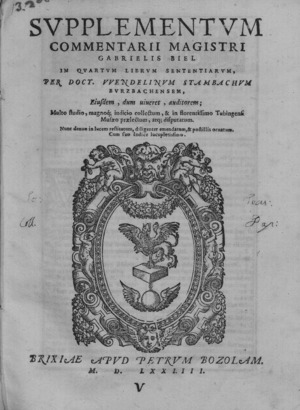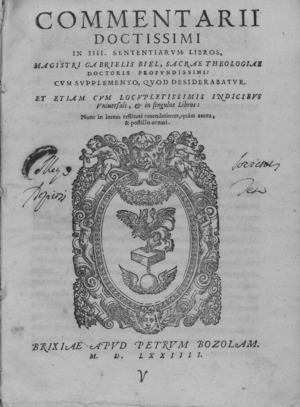Gabriel Biel facts for kids
Gabriel Biel (born between 1420 and 1425 – died December 7, 1495) was an important German scholastic philosopher. He was a member of a religious group called the Canons Regular of the Congregation of Windesheim. This group was like the religious version of the Brethren of the Common Life, who focused on simple living and education.
Biel was born in Speyer and passed away in Einsiedel near Tübingen. In 1432, he became a priest and started studying at Heidelberg University. He did very well and taught there for three years. Later, he continued his studies at the University of Erfurt and the University of Cologne. These universities taught different ideas. Cologne focused on St. Thomas Aquinas and older ways of thinking (called via antiqua). Erfurt focused on William of Ockham and newer ideas (called via moderna). Because Gabriel Biel learned from both, he was known for understanding and using both older and newer philosophical ideas.
Contents
Gabriel Biel's Life Story
Gabriel Biel studied at Heidelberg, Erfurt, and Cologne universities. In the early 1460s, he became a preacher at the Cathedral of Mainz. He also served as a vicar there. While at Mainz, he supported Adolf von Nassau and wrote a book called Defensorium obediente apostolice.
Later, he became a leader for the canons (a type of priest) in Butzbach. He lived in a place called the House of the Brethren until 1468. Duke Eberhard I invited him to be the first leader of the new Brethren House at St. Mark's. He worked there for nine years. He helped the Brethren movement grow by bringing together leaders from the upper Rhine region. He also made sure their religious teachings were part of the school's lessons. In 1479, he became the leader of the canons in Urach.
During this time, Biel worked with Duke Eberhard to start the University of Tübingen. In 1484, he became the first professor of theology at this new university. He was one of the most famous teachers there until he died. He even served as the university's Rector (like a president) in 1484 and 1489. He was almost sixty years old when he started teaching, but his work brought great honor to the young university. His ideas were based on the teachings of his mentor, William of Ockham. In his later years, people called him the "last of the Scholastics," meaning he was one of the last great thinkers in that tradition.
Gabriel Biel retired to a new Brethren House called St. Peter's at Einsiedel, near Tübingen, where he passed away.
Gabriel Biel's Writings
Gabriel Biel's first important book was about the Mass, a Christian church service. His second and most important work was a commentary on the Sentences by Peter Lombard. This book later had a big impact on Martin Luther during the Reformation. In this work, Biel called William of Ockham his teacher. However, he also showed ideas similar to another philosopher named Duns Scotus.
People described Biel as one of the best thinkers of his time. He was clear, exact, and very loyal to the Church. He was able to create a system of religious thought without being accused of having wrong beliefs.
Biel was not narrow-minded in his thinking. Even though he followed one school of thought, he was open to others. He was also interested in the social issues of his time. He had good relationships with Humanists, who were scholars focused on human values and achievements. One Humanist, Heinrich Bebel, called him the "monarch among theologians," meaning he was the king of religious thinkers. His religious writings were often discussed at the Council of Trent, an important meeting of the Catholic Church.
Gabriel Biel lived during a time of change in how people thought. Some believed he focused more on the ideas of Aristotle than on the Scriptures (the Bible). Others thought he supported more freedom in religious teaching.
In 1459, a disagreement started when Diether von Isenburg was chosen as Archbishop of Mainz. He did not pay the required fees, so Adolph von Nassau was given the position instead. When Diether tried to turn people against the Pope, Biel got involved. He strongly supported Adolf and had to run away from Mainz. While hiding, he wrote Defensorium obediente apostolice. This book was about the Pope's authority and the Church's power. He believed the Pope had supreme power, but also that general Church Councils could make the Pope resign if needed.
Biel's ideas were not always completely new. He often explained different viewpoints clearly. He was good at showing how different ideas compared to each other.
Here are some of Biel's opinions on important matters of his time:
- He believed that all Church power, even for bishops, came from the Pope. His support for Adolph von Nassau's claim as bishop earned him thanks from Pope Pius II.
- He thought that priests had the power to forgive sins, and that only the people to be forgiven could be controlled by Church leaders.
- He believed that when someone performs a baptism, they only need to intend to do what the Church intends.
- He stated that the government should not force Jews or non-Christians, or their children, to be baptized.
- He also believed that certain types of business agreements were morally fair. Many of these ideas later became accepted Church teachings.
Other works by Biel include:
- Sacri canonis Missae expositio resolutissima literalis et mystica (1576)
- Epitome expositionis canonis Missae (1565)
- Sermones (1585), which were sermons for Sundays and Christian holidays.
- Collectorium sive epitome in magistri sententiarum libros IV (1574)
- Tractatus de potestate et utilitate monetarum (a book about money)
Gabriel Biel's Ideas on Money and Business
Gabriel Biel had very modern ideas about political economy, which is how countries manage their money and resources. Experts say that Biel understood economics better than many before him. He even added new ideas.
Biel believed that the fair price of something depends on a few things:
- How much people need it.
- How rare it is.
- How hard it is to make.
His list of factors that affect prices was more complete and sensible than what others had come up with. He also thought that merchants (traders) were important. Unlike some thinkers who looked down on merchants, Biel believed their work was good. He thought merchants deserved to be paid for their hard work, the risks they took, and their expenses.
Biel wrote a special book about currency (money) called Ein wahrhaft goldenes Buch. In this book, he strongly criticized rulers who made coins less valuable by mixing in cheaper metals. He said this was a dishonest way to take advantage of people. He also spoke out against rulers who took away common people's rights to use forests, meadows, and water. He also condemned unfair taxes and rich people who took over farmers' lands.
Gabriel Biel's Legacy
In one of his books, Expositio Canonis Missae, Gabriel Biel had an early version of the saying, "You get what you pay for." He wrote, Pro tali numismate tales merces, which means "For such money, such goods."
Works by Gabriel Biel
- Gabriel Biel, Sacri canonis Missae expositio resolutissima literalis et mystica, Brixen, 1576.
- Gabriel Biel, Epitome expositionis canonis Missae, Antwerp, 1565.
- Gabriel Biel, Gabrielis Biel Canonis Misse Expositio, edited by Heiko Oberman and William J. Courtenay, Wiesbaden: Franz Steiner, 1965-1967.
- Gabriel Biel, Sermones, Brixen, 1585.
- Gabriel Biel, Collectorium sive epitome in magistri sententiarum libros IV, Brixen, 1574.
- Gabriel Biel, Tractatvs varii atqve vtilis de monetis, carvmqve mvtatione ac falsitate in gratiam studiosorum ac practicorum collecti, Cologne: Theodorus Baumius, 1574.
- Gabriel Biel, Treatise on the power and utility of moneys, translated by Robert Belle Burke, Philadelphia: University of Pennsylvania Press, and London: Oxford University Press, 1930.
- Gabriel Biel, Defensorium Obedientiae Apostolicae et Alia Documenta, edited and translated by Heiko Oberman, Daniel E. Zerfoss, and William J. Courtenay, Cambridge, MA: Belknap Press of Harvard University Press, 1968.
See also
 In Spanish: Gabriel Biel para niños
In Spanish: Gabriel Biel para niños
- Bartholomaeus Arnoldi von Usingen
- Johann Eck
- Wessel Gansfort
- Johannes von Goch
- Juan de Mariana
- Johann Ruchrat von Wesel
- Paulus Scriptoris
 | Janet Taylor Pickett |
 | Synthia Saint James |
 | Howardena Pindell |
 | Faith Ringgold |



